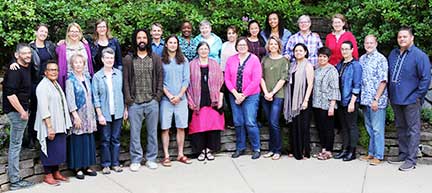Retreat Centers and Transformational Change
Posted on September 1, 2019, by Susan Classen CoL

Photo by Fetzer Institute
How do retreat centers support transformational change? I was among the diverse group of retreat center directors and social movement leaders invited to discuss that question during a three-day meeting in June. Convened by the Fetzer Institute, whose mission is to “help build the spiritual foundation of a loving world,” ours was the last of four regional gatherings in the first phase of Fetzer’s three-year initiative to grow the movement for spiritual and societal transformation.
A priority recognized was network building, and simply reading the bios before the gathering increased my awareness of the wide variety of groups doing retreat work beyond the traditional understanding of “retreat centers.” I learned about groups like Emerging Wisdom and InPower Institute in St. Louis, Taproot Sanctuary and Healing by Choice! in Detroit, Gravity Center in Omaha, Neb., and the online Mystic Soul Project, to name just a few. It’s intriguing to reflect on these emergent social movements as new ways of nourishing the commitment to spirituality, activism and healing needed for our times.
While it’s exciting to see new groups emerging, it’s challenging to see the impact the nationwide decline in religious observance is having on retreat ministries since faith groups have traditionally been the backbone for many retreat centers.
While it’s exciting to see new groups emerging, it’s challenging to see the impact the nationwide decline in religious observance is having on retreat ministries since faith groups have traditionally been the backbone for many retreat centers. Some centers are closing or facing significant questions of long-term sustainability. Meanwhile, social movement groups committed to nourishing the roots of activism are looking for safe, reflective spaces for the programs they are developing. The spaces they are looking for, however, need to be welcoming for a much wider diversity of individuals and groups than the mostly white middle class people who currently frequent retreat centers.
Social movement groups committed to nourishing the roots of activism are looking for safe, reflective spaces for the programs they are developing. The spaces they are looking for, however, need to be welcoming for a much wider diversity of individuals and groups.
Another key element was “Growing Access and Living into a Commitment to Diversity, Equity and Inclusion.” Results from a survey by the Fetzer Institute indicate that by far the majority of retreat center directors are white women in their 60s, and the centers are on land owned by white people. I began to see Loretto retreat work from a wider perspective. What had been a vague concern about the lack of diversity at the Motherhouse retreat centers has blossomed into a profound awareness of both our privilege and our responsibility to broaden our hospitality so that a greater diversity of people feel safe and welcome.
Knobs Haven and Cedars of Peace have a history of stretching and including.
Knobs Haven and Cedars of Peace have a history of stretching and including. From its early years, Knobs Haven received groups from a variety of Christian denominations, thus playing a role in Loretto’s awareness of ecumenism. Cedars of Peace, which started with primarily Catholic nuns, now receives seekers from many faith traditions or no tradition at all. It’s consistent with Loretto and with the retreat ministries to prioritize a new growing edge of stretching to include greater racial diversity.
What potential exists for Loretto as we learn to broaden our white-centered culture to one that is more diverse and multicultural?
Fortunately, the gathering also provided tools and support for doing that. For example, I met a woman who does equity and diversity audits for non-profits. What if we assessed equity, diversity and inclusion at Knobs Haven and Cedars of Peace? What would we learn about the retreat centers, the Motherhouse and the Community? What potential exists for Loretto as we learn to broaden our white-centered culture to one that is more diverse and multicultural?
I returned home challenged by the awareness that retreat centers support personal and societal transformation to the extent that they themselves are willing to adapt and be transformed.
(A special note of gratitude to Katie Gordon from the Nuns and the Nones who was instrumental in inviting Loretto to participate in the Retreat Center Collaborative gathering.)
